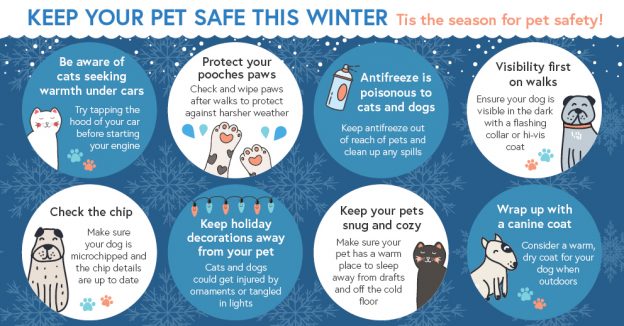When the weather outside is frightful, keep your pets warm, cozy and delightful with our winter pet safety tips!
With temperatures dropping and wintry weather on the way, our four-legged friends need to be prepared for winter just as much as humans do. We aren’t always aware of some of the added dangers lurking during the colder months, and if left outdoors in the cold for too long – pets can freeze, become disorientated, lost or injured.
Check out some of our winter pet safety tips to help you keep your furry friends safe and warm this Winter:
Prepare your dog for spending time outside, and know their limits
Many dogs enjoy wintery walks in the snow, but it’s important to understand the added risks and take precautions to keep them happy and healthy.
Understand your dog’s limits in the cold
Some dogs are more vulnerable to the colder weather than others. Short-coated, thin, elderly, ill or very young dogs may get cold more quickly. So, make sure you understand your dog’s limits and adjust the time they spend outside to support this.
Prepare your dog for wintery walks
If your dog enjoys being outdoors and you will be outside for a trip or walk in wintery weather – consider getting them a warm, dry coat to help them stay warm. Make sure you dog is microchipped and the chip is up-to-date and if you find yourself outside during a snowstorm, keep your dog on a leash to ensure they don’t lose their scent and get lost. Not only this, keep your dog visible during evening walks with a hi-vis coat or flashing collar.
Avoid winter puddles or bodies of water when outside with your pet
Frozen or melting ice can pose dangers for your pet. You don’t know whether frozen water can hold your pet, or whether puddles contain ethylene glycol found in antifreeze, which can be fatal if ingested.
Keep your pooches paws in check
After each walk, its important dry your dog’s paws and stomach to remove ice, salt and chemicals. You should also check for cracks in paw pads or signs of irritation.
Don’t forget your indoor dogs
For dogs and other pets who would prefer to stay indoors in colder weather, make sure they’re still getting the exercise and stimulation they need in other ways, for example by playing games indoors.
Be aware of cats seeking warmth under cars
Cats often seek comfort and warmth under vehicles in wintery weather. To avoid injuring cats, make sure you tap the hood of your car to check for cats and get them to move before starting your engine.
Keep your pet’s indoor spaces warm and cosy
You may need to review your pet’s sleeping arrangements during the winter months to ensure they stay warm. Make sure your pet has a place to sleep that is off the floor and away from drafts. A thick, cozy dog or cat bed with a warm blanket or pillow is perfect!
Antifreeze is poisonous to cats and dogs – keep it out of reach!
Antifreeze could be fatal if ingested by pets – make sure you keep it out of reach and you mop up any spills.
Don’t leave your pets alone in a car during cold weather
Just as you should never leave your pets in a hot car, you shouldn’t leave them in a cold car either. Cars can act as refrigerators during the colder months by holding in the cold, which can cause animals to freeze.
Prepare an emergency pet survival kit
You never know when wintery weather might keep you from leaving the house for extended periods, or when you may get stuck on the roads in the middle of a snowstorm. Make sure that your family survival kit includes your pet. Having an emergency supply of pet food, towels and blankets could save your pet’s life in an emergency!
Be alert, and stay safe
If you’re unsure whether it is too cold for your pet outside – it’s worth remembering that, generally speaking, if it is too cold for you, it is too cold for your pet!

